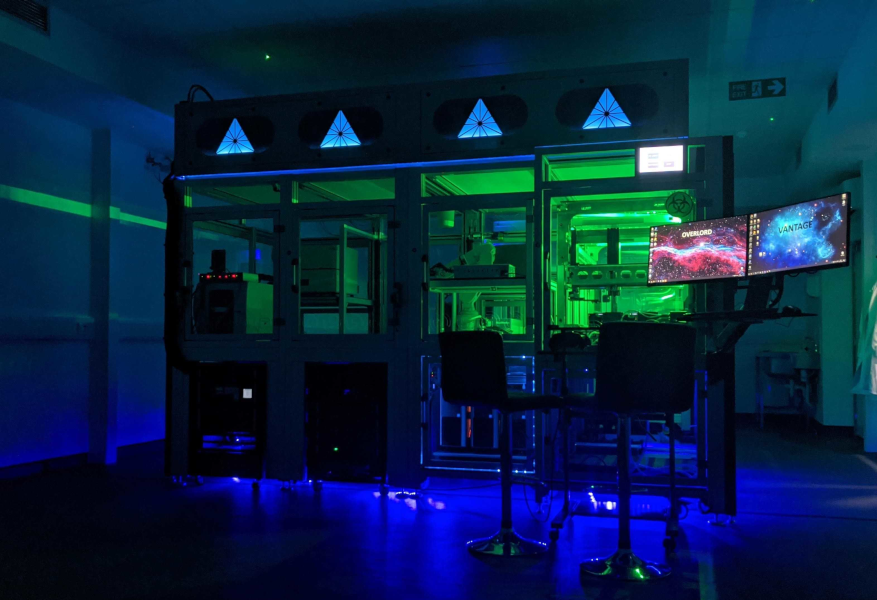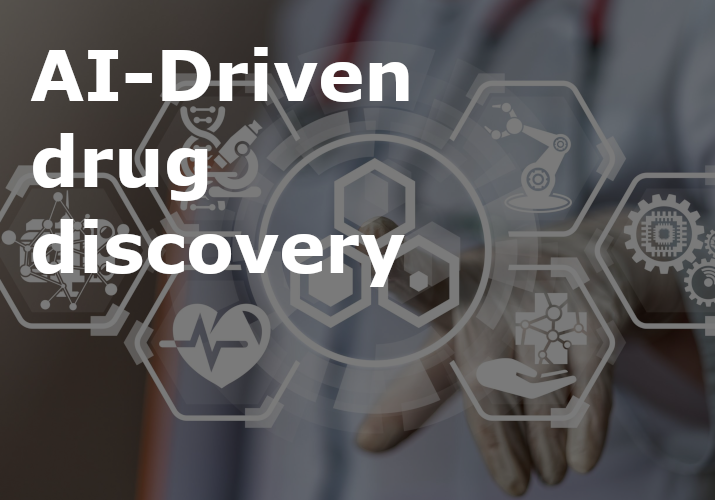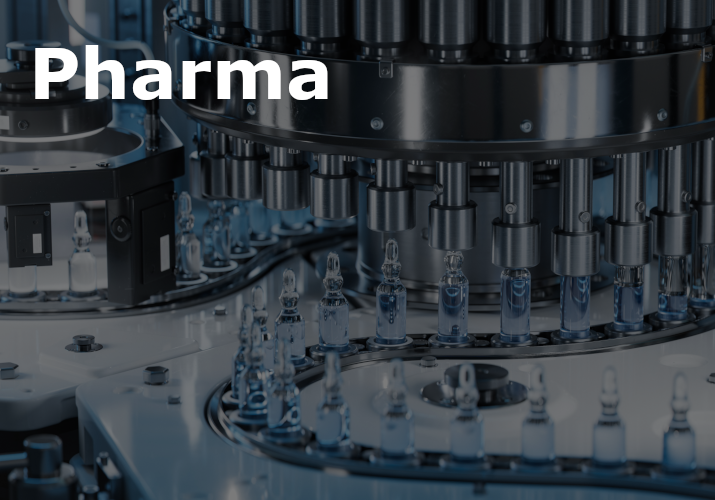Ulysses
Efficient, accurate, and reproducible. Complete data and metadata capture from idea to IND.

We understand our clients needs

- Accelerate program progression with rapidly generated, well structured, biologically relevant data for AI training and validation
- Replace human error and variability with data of unmatched quality and reproducibility
- Collaborate with a team of experienced drug hunters
- Focus on individual core technologies instead of having to set up, run, and maintain wet lab infrastructure
- Work with a team that understands AI-powered drug discovery inside out, and enables you to move faster

- Leverage the power of automation for high-quality, reliable, and highly effective drug discovery to reach the next milestone sooner
- Make better decisions based on better data, leading to higher chance of drug discovery success
- Plan and complete R&D with full transparency and flexibility – and variable instead of fixed costs
- Extend runway through accelerated and capital-efficient drug discovery workflows
- Benefit from excellent scientific and commercial expertise supporting joint decision-making all the way from target selection through to assay cascade design and candidate selection as well as in vivo strategy

- Improve transparency and confidence by working with reliable and compliant drug discovery processes
- Eliminate human error and experimental variability by leveraging the power of automation
- Reduce risk by ensuring data consistency and protocol adherence
- Streamline R&D processes and protect against geopolitical risks by working with a US-UK based service provider
- Make better informed decisions earlier based on solid, reliable, and completely auditable data
- Collaborate with the team and technology trusted by biotech and pharma leaders globally

- Accelerate biomedical research by conducting experiments 24/7 in our fully automated lab
- Gain access to a broad range of techniques, methods and equipment
- Benefit from disruption-free access to new technologies and equipment being continuously updated
- Free up time for project planning, publications, and grant applications by conducting lab operations on our robotic platform
- Bring your research group’s data together in one place – secure, searchable, and fully annotated
-
TARGET VALIDATION
-
Target Validation
We use advanced cellular and molecular biology techniques on our automated platform to validate novel targets. Our approach is driven by our team’s scientific rigour and expertise coupled with technical excellence in automated experiment execution and data analysis, leading to faster progression into the next development stage.
- Target expression and target half-live by quantifying protein turnover and route to degradation
- Target function by investigating changes in phenotype, pathways, and gene expression using gene silencing and gene knockdown/ CRISPR-Cas9 coupled with various cell-based and molecular readouts such as imaging, cell health assays, metabolic assays, qRT-PCR & dPCR, RNA-Seq/ Tempo-Seq, and others
- Advanced insights into effects of target modulation by employing complex models such as organoids and other 3D cell models
-
HIT FINDING
-
Hit Finding
We deploy both the latest in silico and well-established in vitro screening approaches to identify novel developable drug-like matter. This unique pairing of computational techniques (virtual screens, ML-guided molecule selection) and wet lab automation generates high quality hits faster and more efficiently compared to conventional approaches.
- Machine learning guided screening set selection and hit evolution with enhanced hit rates
- In silico screening, docking and molecular dynamics
- In vitro screening and profiling from as few as 5 molecules (for deep mechanistic studies) to full HTS (100k+ compounds)
- Curated and focused libraries (fragments, diversity, natural products, therapeutic areas/ signalling pathways focused)
- Compatibility and management of third-party and custom libraries
- Biophysical screening/ profiling and fragment based drug discovery (FBDD)
- Phenotypic screening by single molecule & synergy matrix screens, cell panels, and cell viability/ cytotoxicity assays
-
HIT-TO-LEAD
-
Hit-to-lead
We deliver rigorous validation and profiling of hits, with Ulysses enabling rich and detailed, quantitative structure-activity relationship (QSAR) mapping, as well as selectivity, kinetic and mechanism of action studies. Our platform returns a comprehensive evaluation of hits, enabling effective and reliable prioritization for progression to lead series- Rapid synthetic hit expansion and diversification
- Advanced medicinal and computer-aided drug design (CADD)
- Ultra high definition kinetic and mechanistic biochemistry/ enzymology
- Binary and ternary complex formation
- Biophysical quantitation of target engagement energetics and kinetics (association/ dissociation)
- Selectivity/ liability profiling and off-target binding
- Bespoke screening cascades and functional cellular assays
- Protein science and (co)crystallography for structure-based drug discovery (SBDD)
-
LEAD OPTIMIZATION
-
Lead optimization
Ulysses delivers accelerated lead optimization by drastically shortening the DMTA cycle time. High reliability precision data generated on our platform drives confident iteration through to candidate selection in a fraction of the time usually required. We continuously develop our library of pragmatic and elucidating assay cascades, leading to superior drug design and enhanced success rates.- Rapid biochemical profiling, kinetics, selectivity, mechanism of action
- Isolated and in-cell target engagement: Lumit/ NanoBRET, and healthy vs disease specificity using sets of cell-based assays
- Cellular mode of action via generation of EC50s, elucidation of pathway modulation, and confirmation of on-target/ off-target effect
- Medicinal and synthetic chemistry (optimising SAR/ SPR/ STR)
- We integrate synthetic, medicinal and computational chemistry for late-stage lead optimization
Target Validation
We use advanced cellular and molecular biology techniques on our automated platform to validate novel targets. Our approach is driven by our team’s scientific rigour and expertise coupled with technical excellence in automated experiment execution and data analysis, leading to faster progression into the next development stage.
- Target expression and target half-live by quantifying protein turnover and route to degradation
- Target function by investigating changes in phenotype, pathways, and gene expression using gene silencing and gene knockdown/ CRISPR-Cas9 coupled with various cell-based and molecular readouts such as imaging, cell health assays, metabolic assays, qRT-PCR & dPCR, RNA-Seq/ Tempo-Seq, and others
- Advanced insights into effects of target modulation by employing complex models such as organoids and other 3D cell models
Hit Finding
We deploy both the latest in silico and well-established in vitro screening approaches to identify novel developable drug-like matter. This unique pairing of computational techniques (virtual screens, ML-guided molecule selection) and wet lab automation generates high quality hits faster and more efficiently compared to conventional approaches.
- Machine learning guided screening set selection and hit evolution with enhanced hit rates
- In silico screening, docking and molecular dynamics
- In vitro screening and profiling from as few as 5 molecules (for deep mechanistic studies) to full HTS (100k+ compounds)
- Curated and focused libraries (fragments, diversity, natural products, therapeutic areas/ signalling pathways focused)
- Compatibility and management of third-party and custom libraries
- Biophysical screening/ profiling and fragment based drug discovery (FBDD)
- Phenotypic screening by single molecule & synergy matrix screens, cell panels, and cell viability/ cytotoxicity assays
Hit-to-lead
We deliver rigorous validation and profiling of hits, with Ulysses enabling rich and detailed, quantitative structure-activity relationship (QSAR) mapping, as well as selectivity, kinetic and mechanism of action studies. Our platform returns a comprehensive evaluation of hits, enabling effective and reliable prioritization for progression to lead series- Rapid synthetic hit expansion and diversification
- Advanced medicinal and computer-aided drug design (CADD)
- Ultra high definition kinetic and mechanistic biochemistry/ enzymology
- Binary and ternary complex formation
- Biophysical quantitation of target engagement energetics and kinetics (association/ dissociation)
- Selectivity/ liability profiling and off-target binding
- Bespoke screening cascades and functional cellular assays
- Protein science and (co)crystallography for structure-based drug discovery (SBDD)
Lead optimization
Ulysses delivers accelerated lead optimization by drastically shortening the DMTA cycle time. High reliability precision data generated on our platform drives confident iteration through to candidate selection in a fraction of the time usually required. We continuously develop our library of pragmatic and elucidating assay cascades, leading to superior drug design and enhanced success rates.- Rapid biochemical profiling, kinetics, selectivity, mechanism of action
- Isolated and in-cell target engagement: Lumit/ NanoBRET, and healthy vs disease specificity using sets of cell-based assays
- Cellular mode of action via generation of EC50s, elucidation of pathway modulation, and confirmation of on-target/ off-target effect
- Medicinal and synthetic chemistry (optimising SAR/ SPR/ STR)
- We integrate synthetic, medicinal and computational chemistry for late-stage lead optimization
Work with us
Our proposals are tailored to each project and our client’s and partner’s mission, and range from single project engagements to strategic multi-year, multi-target partnerships. Learn more about successful projects via our case studies, or contact us on welcome@arctoris.com to discover how we can support you in bringing new drugs to patients.Contact us now to explore opportunities for us to work together.